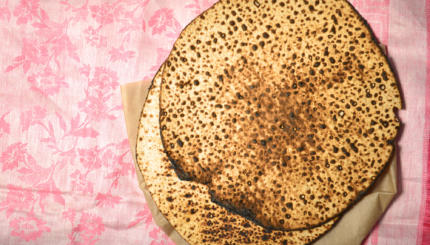Question: I’m a college student and I want to sell my hametz (leavened food) for Passover. One of my suitemates isn’t Jewish. Can I just sell my hametz to her? How do I do it?
–Shayna, College Park
Answer: Did you know that during Passover an Arab man in Abu Ghosh owns almost all of the bread in Jerusalem? I like to imagine him frolicking with bagels and pasta while the Jewish quarter suffers through another sheet of matzah.
As you may know, on Passover Jewish law prohibits a Jewish person from owning or deriving any benefit from anything made out of five major grains (wheat, barley, spelt, oats, and rye) (Exodus 12:19, 13:7). Collectively, these grains are known as hametz. For years, people got rid of all their hametz before the holiday began. If this is easy for you to do, by all means, eat or toss your granola bars and crackers and then you don’t have to worry about arranging any sale.
With your help, My Jewish Learning can provide endless opportunities for learning, connection and discovery.
But as early as mishnaic times in the third century CE, if a person didn’t want to use up or throw out his hametz before Passover, he could sell it to a non-Jew, provided the sale was permanent (Pesahim 21a).
In Poland in the late 16th century, many Jews worked in the liquor industry, and used fermented grain to make their product. At Passover, they didn’t want to sell their grain permanently to a non-Jew, because it was the source of their livelihood. So Rabbi Joel Sirkes, a halakhic authority of the time, known as the Bach, began allowing people to sell their hametz to non-Jews without removing the hametz from their own homes, and without selling the hametz permanently. However, Rabbi Sirkes made sure to stipulate that the sale of the hametz must be a real sale, and not a legal fiction: During Passover, you must really think that the hametz isn’t yours, and the non-Jew who buys it must really think that he can use it however he wishes.
Today, there are a lot of organizations and synagogues that will sell your hametz for you. Basically, you fill out a form about where your hametz is going to be during Passover, and the shul or group sells it to a non-Jew on your behalf. You can even fill out forms and do it online.
But you asked about doing it yourself, and that’s a great idea, so I got in touch with Rabbi Josh Feigelson, Campus Rabbi and Senior Director for Educational Initiatives at Northwestern University. Rabbi Feigelson emphasized that what is most important is that both you and your suitemate take the sale seriously: “As both Maimonides and the Shulhan Arukh make clear, the most important aspect of these procedures is that one truly believe that one no longer has any ownership of the hametz in one’s possession — that the hametz belongs to someone else.”
Rabbi Feigelson also weighed the benefits of going through an institutional sale versus doing it yourself: “Many halakhic authorities would hold that there are specific formal requirements of kinyan, acquisition, that need to be satisfied, and if one is concerned about these, one should perform an institutional sale. But in an important way, selling hametz to someone you know might actually be preferable to an institutional sale. While an institutional sale certainly is halakhically valid, selling or giving your hametz to a friend or roommate makes the surrender of property that much more real –provided that your friend or roommate really does feel that the hametz is theirs and that they have full use of it during Pesach.”
So how do you actually go about selling your hametz to your suitemate? Probably the easiest thing to do is copy and paste the text of an online form for selling hametz into a document. The text probably has a place for your name, and the name of the rabbi or leader who will be selling the hametz on your behalf. Take out the rabbi’s name, and make sure to fill in your suitemate’s name as the person who will now be the owner of the hametz. Then, you should negotiate a price with your suitemate. Don’t just choose an arbitrary number, like $5. Actually think about everything of yours that you’re giving up, and estimate what it’s worth.
You’ll need to get your suitemate to give you either cash or a check for that amount. Make sure to show your suitemate where all of your hametz is, and make it clear that she’s really buying it from you, and will be its owner. After the holiday is over, you can buy the hametz back from her (if she gave you cash, you can just give it right back; if she gave you a check, you can write her one for the same amount). There’s no need for a contract when you’re buying back your hametz.
Selling your hametz to your suitemate is a perfectly acceptable solution to the problem of selling hametz on Passover. Great initiative, Shayna!
hametz
Pronounced: khah-METZ or KHUH-metz, Origin: Hebrew, bread or any food that has been leavened or contains a leavening agent. Hametz is prohibited on Passover.
shul
Pronounced: shool (oo as in cool), Origin: Yiddish, synagogue.



